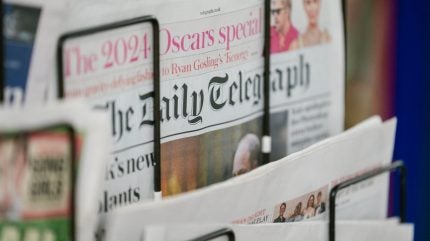
The UK government has quashed RedBird IMI’s UAE-backed $600m takeover of Telegraph Media Group, with Prime Minister Rishi Sunak on Wednesday (13 March) outlining plans for new legislation to prevent foreign states buying UK news organisations.
Spearheaded by former CNN boss Jeff Zucker, the bid would have seen the Telegraph and Spectator titles controlled by RedBird IMI, a consortium funded by a private US investment firm and the UAE’s vice-president Sheikh Mansour bin Zayed Al Nahyan, also owner of Manchester City.
The attempted takeover had been heavily scrutinised by Conservative MPs, analysts and human rights groups, who point to the Gulf state’s restrictions on press freedom.
A RedBird IMI spokesperson tells Investment Monitor that “we are extremely disappointed” by the UK government’s decision.
“To date, RedBird IMI has made six investments across the UK and US, and we believed the UK’s media environment was worthy of further investment,” the spokesperson says. “As with each of our deals, we have been clear that the acquisition of the Telegraph and the Spectator has been a fully commercial undertaking.”
Concerns over press freedom or a political agenda?
Sunak’s response represents a global trend of government protectionism over foreign acquisition of media and tech assets – and the sitting Conservative Party’s fondness for its favourite news outlets.
Alongside the Sun, Daily Express and Daily Mail, the Spectator and Telegraph are two of the UK’s most right-wing-leaning news outlets.
The news has been welcomed by some executives at both publications, and may buy Sunak some favourable coverage to boost his party’s poor polling ahead of the UK election later this year.
Media mogul Rupert Murdoch will also have been watching proceedings closely, as owner of global conglomerate News Corp. which bid for the Spectator last year.
Murdoch and Daily Mail chairman Jonathan Harmsworth have held back-channel discussions of a joint deal to buy Telegraph Media Group from the Barclay family, Bloomberg reported.
Moving forward, RedBird IMI plans “to invest in and grow the brand and the business, both in the UK and other English language media markets, particularly in the US”, the spokesperson concludes.
Users protest as the US moves to ban TikTok
The US, however, is unlikely to be lenient towards attempts by foreign states to buy influence in media platforms, whether by RedBird IMI or otherwise.
On 13 March, the US House of Representatives passed a bill which could ban social media app TikTok if its Chinese owner ByteDance refuses to sell the platform to an entity that satisfies President Joe Biden’s government.
The bill passed with bipartisan support by a vote of 352-65, on the grounds the Chinese Communist Party (CCP) may use it to monitor US user data or spread pro-Beijing propaganda.
It now moves to the Senate, where its future remains unclear.
In response, TikTok has launched an aggressive lobbying strategy, while US protestors have gathered outside the Capitol building in Washington DC.
Many say that their livelihood is at stake, while there are serious concerns over how a TikTok ban would affect businesses.
China’s response has been blunt. Foreign Ministry spokesperson Wang Wenbin described it as an “act of bullying” by the US which threatens trust in international investment and would “backfire”.
Beijing already blocks most US social media platforms including X, Instagram, Meta, YouTube and Google because they refuse to follow Chinese government rules on data collection and content sharing types.
Global protectionism beyond the Telegraph takeover
The US has led on increasingly protectionist rhetoric. Treasury Secretary Janet Yellen called on the US and allies to prioritise supply chains “with countries we can count on” earlier this year when addressing Washington’s export restrictions on Chinese semiconductor technology.
Australia, Canada and European nations have also pushed for more stringent vetting of Chinese investment, while human rights groups have criticised the image-washing investments across media, sport and tourism by Gulf states including the UAE, Saudi Arabia and Qatar.
This, coupled with rising tensions across the Middle East, Europe, East Africa and South China Sea has prompted governments worldwide to fast-track FDI from allied nations rather than those which are geographically close.
Such ‘friendshoring’ may cut long-term economic output by 2% globally, according to the IMF. It has become particularly prominent in defence industries, which often have the closest ties to the state, nation and its geopolitical ambitions.
Russia’s invasion of Ukraine has prompted US and European arms suppliers to close ranks. Similarly, Japan has revised laws on anti-takeover defence risks while Indian Prime Minister Narendra Modi has called for “indigenisation” of arms production as New Delhi casts cautious looks west to hostile Pakistan and east to the threat of China.
This week, all eyes have been on the UK and US’ defensive shields set around the Telegraph and TikTok.
Attention now turns to the economic ramifications of an increasingly ‘friendshored’, protectionist world order.



